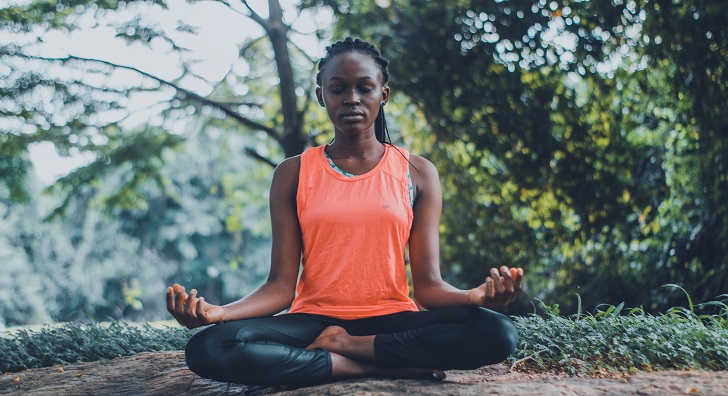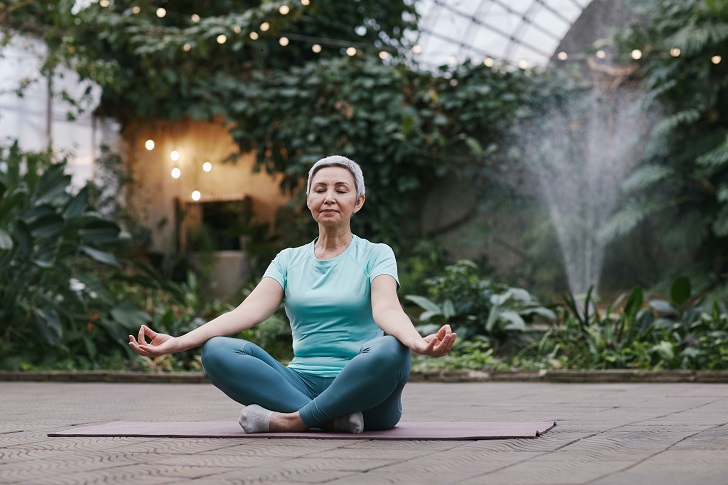
The Right Age for Yoga: A Lifelong Journey to Wellness

Yoga offers numerous physical, mental, and spiritual benefits. As it gains popularity worldwide, people often wonder about the ideal age to begin practicing yoga. The beauty of yoga lies in its inclusivity, as individuals of all ages can enjoy it. This article will explore the right age to start practicing yoga, highlighting the benefits and considerations for different age groups.
Yoga for Children (Ages 3-12)
Building Healthy Habits
Introducing yoga to children early helps instill healthy habits and fosters a positive relationship with physical activity. Yoga promotes body awareness, coordination, and balance while encouraging flexibility and strength development. Additionally, children learn valuable mindfulness techniques that aid in emotional regulation and stress management.

Valeria Ushakova/ Pexels | Yoga is a practice that stimulates your inner light
Enhancing Concentration and Focus
Yoga allows children to slow down, breathe, and practice mindfulness. Children learn to concentrate and focus on their breath, body, and present moment through age-appropriate yoga classes. This skill is precious in today’s fast-paced world of great distractions.
Promoting Social Interaction
Yoga classes for children often incorporate games, partner poses, and group activities, fostering social interaction, teamwork, and cooperation. It allows children to develop friendships, enhance communication skills, and build a sense of community.
Yoga for Teenagers (Ages 13-19)
Physical Health and Fitness
Teenagers often experience significant physical changes and growth. Yoga can help teenagers build strength, improve flexibility, and enhance physical fitness. It offers a non-competitive environment where teenagers can develop body awareness and self-acceptance, promoting a positive body image.
Managing Stress and Anxiety
Adolescence can be a challenging and stressful period. Yoga is a valuable tool for teenagers to manage stress, reduce anxiety, and improve mental well-being. Breathing techniques and relaxation exercises taught in yoga classes can be particularly beneficial for teenagers navigating academic pressures and emotional changes.

Oluremi Adebayo/ Pexels | Yoga is to the mind what exercise is to the body
Developing Mindfulness and Emotional Intelligence
Yoga encourages teenagers to connect with their emotions and cultivates mindfulness. Through regular practice, teenagers can develop self-awareness, emotional intelligence, and the ability to regulate their emotions effectively. These skills lay a foundation for healthy relationships and overall well-being.
Yoga for Adults (Ages 20-50)
Physical Strength and Flexibility
Adults of all ages can benefit from yoga’s ability to improve physical strength, flexibility, and balance. Regular practice can alleviate issues like back pain, improve posture, and enhance body awareness. Yoga also offers a low-impact exercise that is gentle on the joints.
Stress Reduction and Mental Clarity
Work, family, and daily life demands can often lead to stress and overwhelm. Yoga provides a sanctuary for adults to unwind, release tension, and cultivate mental clarity. The combination of movement, breathwork, and meditation helps reduce stress hormones and promote a sense of inner peace.
Aging Gracefully
As adults enter their 40s and 50s, yoga becomes even more valuable in maintaining overall health and well-being. Regular yoga can help manage age-related changes, such as joint stiffness and reduced mobility. It promotes healthy aging by keeping the body supple, improving circulation, and supporting bone density.

Marcus Aurelius/ Pexels | Yoga does not start or end on your mat but is present in every breath you take
Yoga for Seniors (Ages 50+)
Enhancing Physical Function and Balance
Yoga can be adapted to meet the specific needs of seniors, offering gentle movements that enhance physical function, balance, and flexibility. Regular practice can reduce the risk of falls, improve joint mobility, and maintain independence in daily activities.
Promoting Mental and Emotional Well-being
Yoga allows seniors to cultivate mindfulness, reduce stress, and find emotional balance. It can alleviate symptoms of depression, anxiety, and insomnia that are often associated with aging. Additionally, yoga classes can offer social connections and a sense of community.
Nurturing Spirituality and Inner Growth
Yoga is a gateway to spiritual exploration and inner growth for many seniors. The practice allows for self-reflection, a deeper connection with oneself, and a sense of purpose. Yoga’s emphasis on present-moment awareness and gratitude can contribute to a fulfilling and meaningful later stage of life.
Yoga is a practice that transcends age boundaries and offers benefits at every stage of life. From children to seniors, the right age to start practicing yoga is when an individual is ready to embark on self-discovery and holistic well-being.
Whether seeking physical strength, mental clarity, or spiritual growth, yoga provides a path to enhance the quality of life for individuals of all ages. Embrace yoga practice at any age, and unlock the transformative power it holds for your mind, body, and soul.
More in Nutrition & Weight Loss
-
`
Amanda Bynes Pregnant at 13? Debunking the Rumors
In recent years, the internet has been ablaze with rumors surrounding former child star Amanda Bynes, particularly regarding allegations of a...
July 1, 2024 -
`
Can Baking Soda Clean Your Lungs?
Years of inhaling cigarette smoke, pollution, and other toxins can leave you longing for a way to cleanse your lungs. The...
June 27, 2024 -
`
How to Build Muscle Mass After 60? 5 Proven Strategies
Curious about how to build muscle mass after 60? You are not alone. And the good news is that it is...
June 20, 2024 -
`
Prediabetic Foods That Can Lower Your Blood Sugar in 2024
Prediabetes is a health condition characterized by blood sugar levels that are higher than normal but not high enough to be...
June 13, 2024 -
`
Kelly Clarkson’s Weight Loss Journey | Here Are the Details
Kelly Clarkson’s weight loss has been a hot topic among fans and media alike. The iconic American singer and host of...
June 3, 2024 -
`
Essential Vitamins for Gut Health – A Comprehensive Guide
Our gut does more than just digest food – it plays a vital role in immunity, mood, and overall health. But...
May 30, 2024 -
`
Looking to Build A Stronger Sculpted Back? Try Cable Back Workouts
Back workouts using cables, or cable back workouts as they are commonly known, have become the gold standard for anyone aiming...
May 22, 2024 -
`
How Much Water Should I Drink on Creatine? Hydration Tips
Creatine, a popular supplement among athletes and fitness enthusiasts, has gained widespread recognition for its ability to enhance muscle strength, power,...
May 17, 2024 -
`
What Is Bruce Willis’s Net Worth? Get the Inside Scoop Here!
Bruce Willis, the action hero who has saved the day countless times on screen, has built a legendary career. But how...
May 11, 2024















You must be logged in to post a comment Login